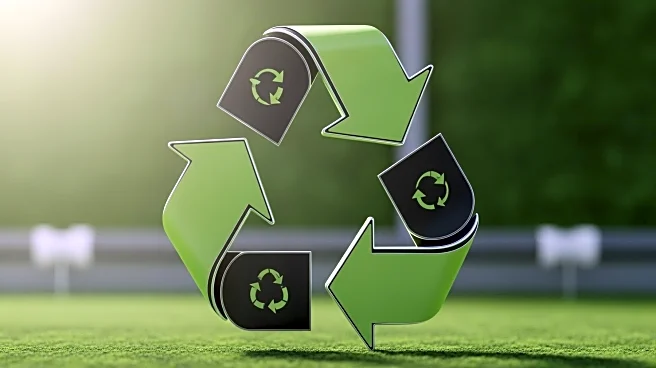What's Happening?
The High Ambition Coalition on Plastics is pushing for significant reforms in the plastic recycling industry, emphasizing the need for political action to prevent Europe from becoming reliant on unsustainable
imports. The UK government is currently consulting on changes to support domestic recycling efforts, having already invested £10 billion in new plastic sorting and processing facilities. The coalition highlights the risk of Europe losing its recycling industry to cheaper imports, which could undermine economic resilience and climate leadership. The UK alone exported around 600,000 tonnes of plastic waste last year, a 5% increase from 2023, due to loopholes in legislation that incentivize exports over domestic processing.
Why It's Important?
The push for reform in the plastic recycling industry is crucial as it addresses the growing dependency on cheaper, unsustainable imports, which could have long-term negative impacts on the economy and environment. The closure of recycling plants across Europe and the U.S. due to high operational costs and the low price of virgin plastic highlights the industry's vulnerability. This situation affects not only the recycling industry but also the broader goal of achieving a circular economy. The reforms could lead to increased use of recycled materials, reducing environmental impact and supporting local economies.
What's Next?
The UK government is expected to consider the coalition's recommendations seriously, with consultations ongoing to determine the necessary changes to save the plastic recycling industry. The introduction of a single plastic recycling certification scheme is being urged to reduce exports and encourage the use of recycled packaging. Additionally, the Deposit Return Scheme, set to launch in October 2027, aims to improve recycling quality by incentivizing consumers to return bottles and cans. These measures could significantly impact the industry's future, potentially leading to a more sustainable and economically viable recycling sector.
Beyond the Headlines
The broader implications of these reforms could lead to a shift in how plastic waste is managed globally. By reducing reliance on exports and promoting domestic recycling, countries could enhance their environmental policies and economic independence. The success of these initiatives could serve as a model for other regions facing similar challenges, potentially leading to a global shift towards more sustainable waste management practices.









